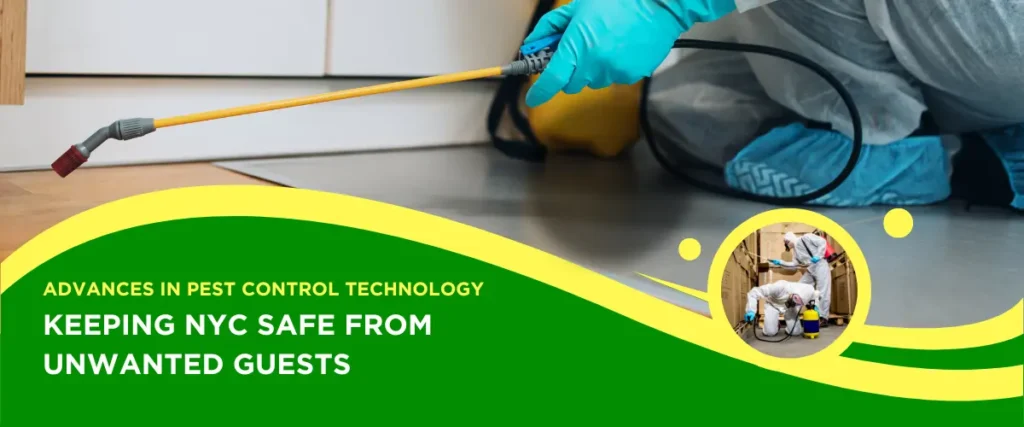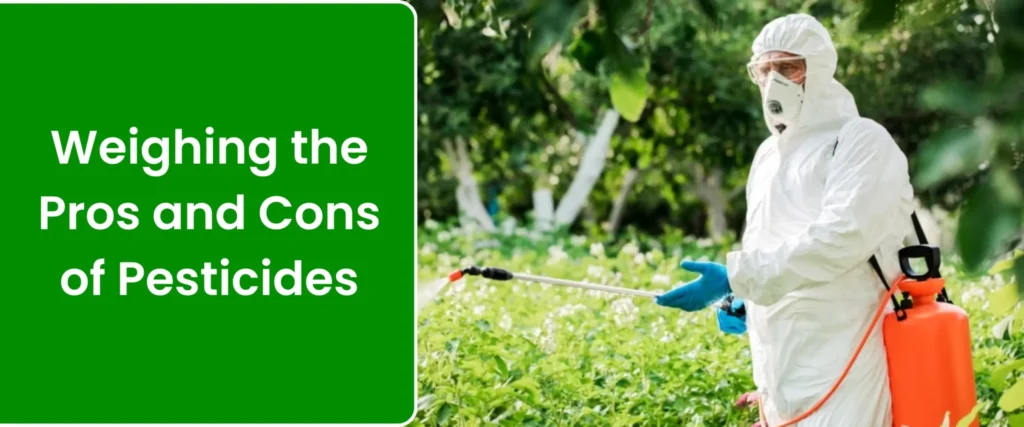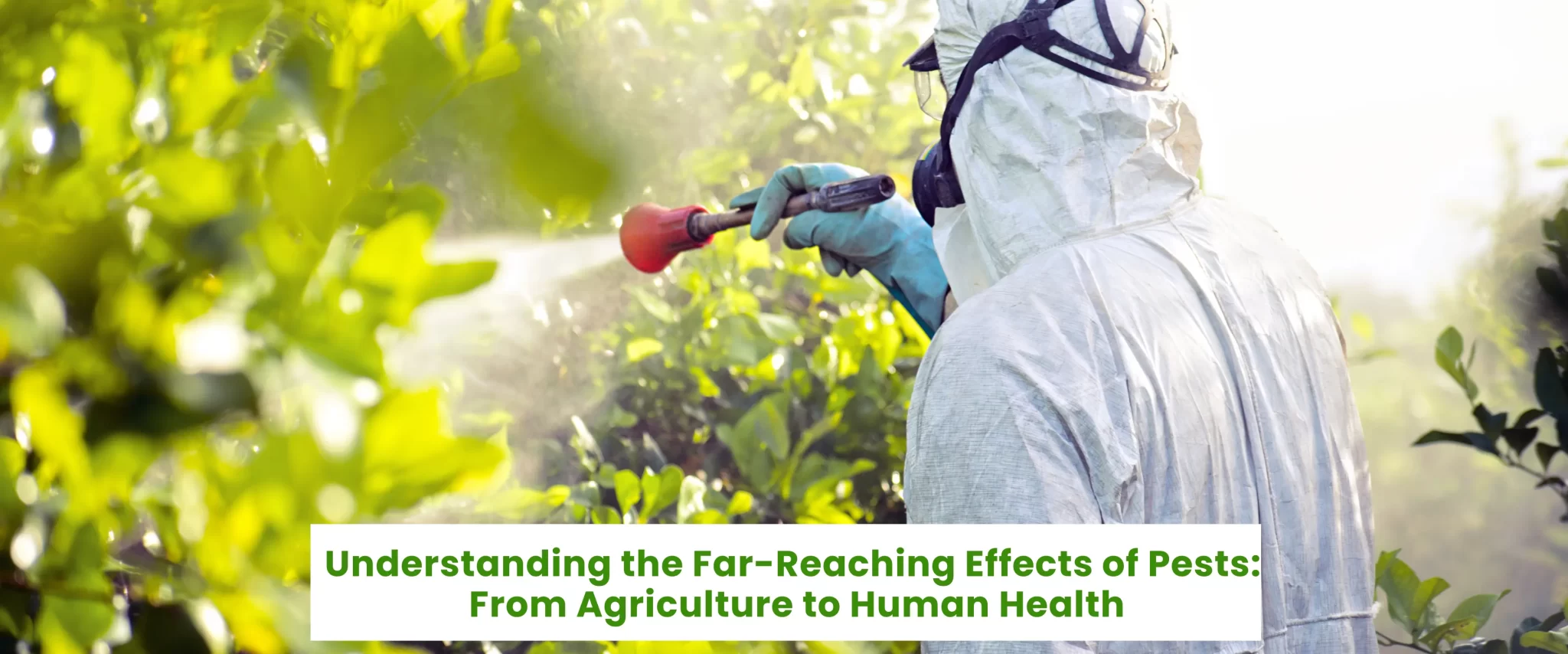
Imagine a world where our food supply is under constant attack. Billions of hungry insects, rodents, and diseases threaten our crops and livestock, leaving us with empty shelves and rising food prices. This isn’t a dystopian future, but a very real possibility without effective pest control.
This blog delves into the critical role pest control plays in agriculture. We’ll explore the devastating effects pests have on crops, livestock, and ultimately, human health. We’ll also examine the various pest control services available to farmers, from modern techniques to the benefits of professional intervention.
The Role of Pest Control in Agriculture
Why is Pest Control Important in Agriculture?
Pests are a constant threat to agricultural productivity. From insects devouring crops to rodents spreading diseases, even a small infestation can have a significant impact. Here’s why pest control is crucial:
- Maintaining Crop Health and Productivity: Pests directly damage crops, reducing yields and overall quality. Left unchecked, infestations can lead to crop failure, impacting food security and causing economic hardship for farmers.
- Economic Impact of Pest Infestations: The losses due to pests are staggering. Studies show that pests can destroy or damage up to 40% of global food production annually. Effective pest control helps farmers minimize these losses and ensure financial stability.
Agricultural Pest Control Services
Modern Techniques and Methods:
Gone are the days of solely relying on broad-spectrum pesticides. Today, agricultural pest control utilizes a multi-pronged approach, including:
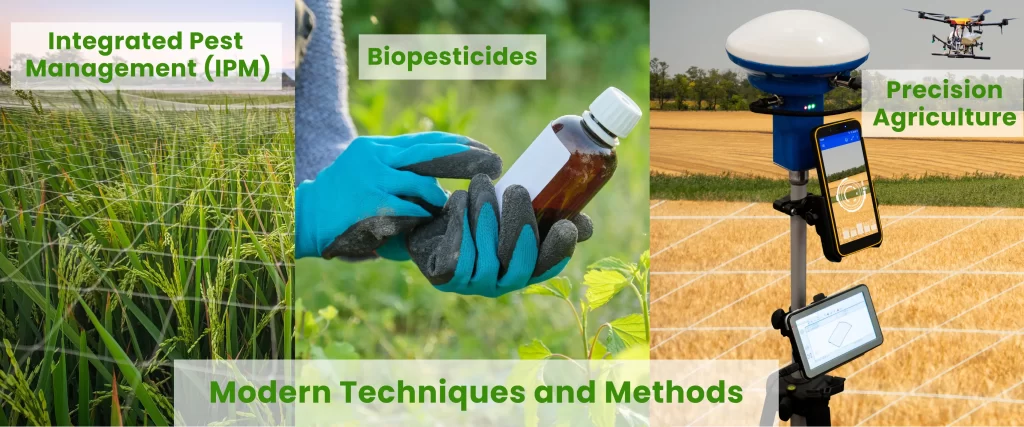
- Integrated Pest Management (IPM): This strategy emphasizes monitoring pest populations, identifying the specific pest, and using targeted methods like biological control (natural predators) or cultural practices (planting cycles) to minimize reliance on chemical solutions.
- Biopesticides: These are naturally derived pesticides that target specific pests while minimizing harm to beneficial insects and the environment.
- Precision Agriculture: Modern technology allows for targeted application of pesticides using drones or GPS-guided equipment, reducing waste and environmental impact.
Benefits of Professional Pest Control Services
While farmers can implement some basic pest control practices, professional services offer distinct advantages:
- Expertise and Experience: Professionals have the knowledge and experience to identify specific pests and recommend the most effective control methods.
- Access to Advanced Technologies: They have access to specialized equipment, formulations, and application techniques for better pest control.
- Reduced Risk of Environmental Damage: Professionals understand the importance of using pest control methods responsibly, minimizing environmental impact.
Effects of Pests and Diseases on Agriculture
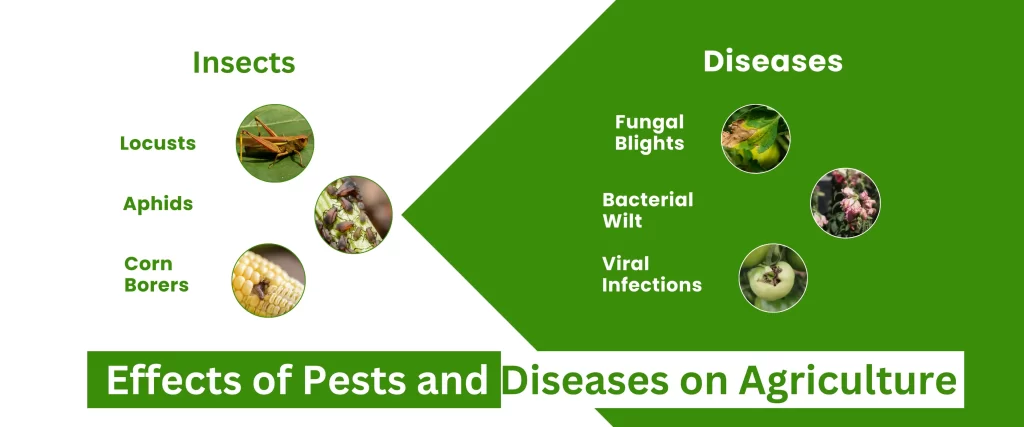
Crop Damage and Losses
Pests and diseases are the arch villains of agriculture, wreaking havoc on crops and causing significant losses. These tiny invaders can devastate entire fields, leaving farmers with withered dreams and empty pockets.
Examples of Pest Damage:
- Insects:
- Locusts: These ravenous grasshoppers can form massive swarms that devour entire fields in a matter of hours.
- Aphids: These sap-sucking insects weaken plants and transmit harmful viruses.
- Corn Borers: These caterpillars tunnel into corn stalks, reducing yields and causing the plants to collapse.
- Diseases:
- Fungal Blights: These diseases cause crops to rot and wilt, often leaving behind discolored and inedible produce.
- Bacterial Wilt: This disease clogs a plant’s vascular system, preventing water and nutrients from reaching the leaves and fruit, leading to wilting and death.
- Viral Infections: Viruses can stunt plant growth, deform fruits, and render crops unmarketable.
The specific damage caused by pests and diseases varies depending on the crop and the type of invader. However, the end result is often the same: reduced yields, lower quality produce, and ultimately, crop failure.
Economic Impact
The financial losses due to pests and diseases are staggering. Studies estimate that these threats can destroy or damage up to 40% of global food production annually. This translates to billions of dollars lost in revenue for farmers, impacting not only their livelihoods but also the global food supply chain.
Food Prices and Supply Chain Disruptions:
Pest infestations can lead to significant price hikes for consumers. When crops are damaged or destroyed, the resulting scarcity drives up prices, making food less affordable for everyone. Additionally, disruptions in the supply chain caused by widespread pest outbreaks can lead to food shortages in certain regions.
Environmental Consequences
The battle against pests often has unintended consequences for the environment. In an attempt to protect their crops, farmers may resort to heavy pesticide use. While these chemicals effectively target pests, they also harm beneficial insects, pollinator populations, and soil health. This can disrupt ecosystems and lead to the development of pesticide resistance in pest populations, creating a never-ending cycle of chemical use.
Effects of Pests on Human Health
Pests aren’t just a nuisance; they pose a significant threat to human health. Their presence can cause both direct health problems and significant psychological distress.
Direct Health Risks
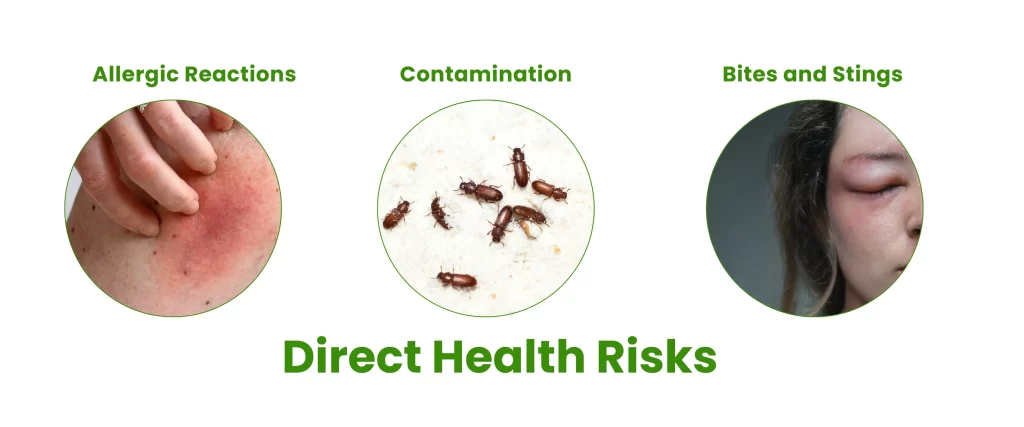
Pests can directly harm our health through:
- Bites and Stings: Many pests, like mosquitoes, bees, and wasps, can bite or sting, causing pain, swelling, and allergic reactions in some individuals. Severe allergic reactions can be life-threatening and require immediate medical attention.
- Allergic Reactions: Pests like cockroaches, mites, and rodents shed skin and droppings that can trigger allergic reactions, including asthma attacks, itchy eyes, and difficulty breathing.
- Contamination: Rodents and insects can contaminate food and surfaces with bacteria, viruses, and parasites. These contaminants can lead to foodborne illnesses like salmonellosis and E. coli.
Common Culprits:
- Mosquitoes: These insects transmit a variety of diseases, including malaria, dengue fever, and Zika virus.
- Bed Bugs: Their bites can cause itchy welts and disrupt sleep, leading to fatigue and anxiety.
- Rodents: Rats and mice can carry and spread diseases like hantavirus and leptospirosis through their droppings and urine.
Disease Transmission
Pests often act as vectors, transmitting diseases between animals and humans. They can carry pathogens on their bodies or in their saliva, which are then introduced into the human body through bites, stings, or contaminated food. This is how diseases like Lyme disease (carried by ticks) and plague (carried by fleas) are spread.
Psychological Impact
Living with a pest infestation can be a stressful and anxiety-inducing experience. The constant worry about bites, stings, and contamination can disrupt sleep patterns and negatively impact mental well-being. Additionally, the presence of pests can make people feel uncomfortable and ashamed in their own homes.
Five Unwanted Guests: How Pests and Rodents Threaten Your Health
Pests and rodents are more than just creepy crawlies and unwelcome roommates. They pose a significant threat to our health in several ways. Let’s delve into the five main effects these unwelcome guests can have on our well-being.
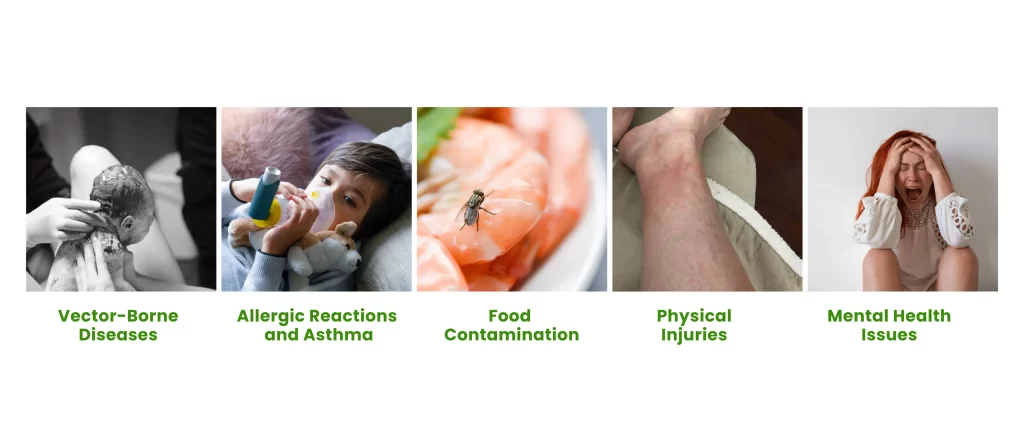
- Allergic Reactions and Asthma: Many pests, like cockroaches, dust mites, and rodents, shed skin and droppings that contain allergens. These microscopic particles can trigger allergic reactions, causing symptoms like itchy eyes, runny nose, sneezing, and difficulty breathing. In individuals with asthma, pest allergens can exacerbate existing conditions, leading to asthma attacks.
- Vector-Borne Diseases: Pests like mosquitoes, ticks, and fleas act as carriers for various diseases. These diseases, known as vector-borne diseases, can be transmitted to humans through bites or stings. Some common examples include Lyme disease (ticks), malaria (mosquitoes), and typhus (fleas). These diseases can have serious health consequences, ranging from fatigue and fever to organ damage and even death.
- Food Contamination: Pests like rodents and insects can contaminate food and surfaces with bacteria, viruses, and parasites. They often crawl on food prep areas, leaving behind harmful pathogens. Additionally, their droppings can contaminate stored food items. Consuming contaminated food can lead to foodborne illnesses, causing nausea, vomiting, diarrhea, and dehydration.
- Physical Injuries: Bites and stings from various pests can cause physical injuries. While some bites may only be a minor annoyance, others can be quite painful and lead to swelling, infection, and allergic reactions. For example, bee stings can be life-threatening for individuals with severe allergies. Additionally, rodents may bite if they feel threatened, causing puncture wounds.
- Mental Health Issues: Living with a pest infestation can be a stressful and anxiety-inducing experience. The constant worry about bites, stings, and contamination can disrupt sleep patterns and negatively impact mental well-being. The feeling of disgust and being invaded in your own home can lead to feelings of shame and helplessness. In severe cases, pest infestations can contribute to anxiety disorders and depression.
The Final Bite: Why Pest Control Matters
Throughout this blog, we’ve explored the far-reaching effects of pests and diseases. We’ve seen how they devastate crops, disrupt the food supply chain, and pose a significant threat to human health. From triggering allergies and spreading diseases to contaminating food and causing mental distress, pests are a force to be reckoned with.
The good news is that we don’t have to live at the mercy of these unwanted guests. Effective pest control is crucial to ensure:
- Thriving Agricultural Industry: By minimizing crop damage and losses, pest control safeguards our food supply and contributes to a more sustainable agricultural future.
- Healthy Communities: Protecting ourselves from pest-borne diseases and allergic reactions promotes a healthier population and a higher quality of life.
Taking Action for a Pest-Free Future
Don’t wait until you’re facing a full-blown infestation! Proactive pest control is essential. If you suspect pest activity in your home or business, consider seeking professional pest exterminator help.

